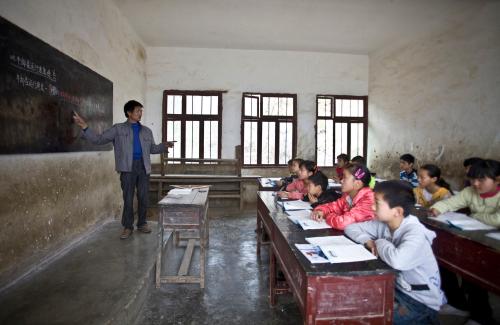The youth unemployment crisis in Jordan is stark. According to World Bank data, 37 percent of Jordanian youth ages 15-24 are unemployed, and this statistic has risen nearly 10 percentage points in the past five years. Jordan has the third highest unemployment rate in the Middle East and North Africa region, home of the world’s highest youth unemployment rate for the past 25 years.
Financial literacy helps prepare young people for the workforce. Knowing how to manage a bank account, create a budget, or save money helps youth improve their employability and take control of their financial future. Despite the importance of these skills, Jordanian youth remain financially excluded—in 2017, only 20 percent of 15- to 24 year-olds had a bank account and just 4 percent took out a loan.
To address these challenges, the Central Bank of Jordan (CBJ), the Ministry of Education (MoE), and Jordanian nonprofit INJAZ launched a Financial Education Program (FEP) in 2016 to deliver financial and entrepreneurial skills training to students in grades seven through 12 across all public, private, and refugee schools. During the past school year, the FEP reached 723,015 students nationwide. In addition to building competence in economics and accounting, the FEP promotes 21st century skills such as critical thinking, negotiation, and teamwork. These transferable skills help Jordanian youth embrace an entrepreneurial mindset that can create new jobs and spur economic growth.
What contributed to national scaling of the program?
The challenge of skilling youth for the workforce of tomorrow is not unique to Jordan. Most countries are grappling with the same questions. Learning from Jordan’s experience could help inform large-scale efforts to transform other education systems. Certain factors in Jordan have helped lay the foundation for the FEP to flourish and grow to national scale: a committed government champion, accomplished local experts, and effective private sector engagement. These same elements applied in different contexts could expand and deepen the impact of other national education programs.
Strong government champion
Dr. Ziad Fariz, the CBJ Governor since 2012, displayed strong leadership in introducing the FEP. He raised awareness around an urgent national problem, created structures and policies to address the issue, and then worked across sectors to implement the FEP through a phased approach. In 2016, Jordan made a bold commitment to the Maya Declaration, a global framework for countries to make measurable improvements to financial inclusion. The commitment required creating a national Financial Inclusion Strategy, which Jordan launched in late 2017, making it the first country in the Arab region to do so. These achievements led the Union of Arab Banks to honor Dr. Fariz with its Leadership Vision Award. Rolling out a new national initiative with the support of several ministries and key stakeholders requires a strong champion that can articulate a clear vision and then inspire collective action to achieve shared goals.
Well-qualified local experts
A key contributor to the FEP’s success was including local experts in the development and implementation of the program. Since 2001, INJAZ has delivered financial literacy programs in more than 200 schools throughout all 12 governorates in Jordan. This includes developing curriculum, training teachers and ministry officials, and monitoring program outcomes at the school level. This experience has helped INJAZ build critical trust with local communities that facilitates smooth program implementation. Recognizing that financial literacy is only one part of the employment challenge, INJAZ recently established a “My Start Up” business incubator that provides young entrepreneurs with a physical space to grow their ideas and connects them to mentorship and training opportunities to turn their business dreams into reality. Successfully implementing a national program such as FEP requires working with organizations, such as INJAZ, that have the credibility and expertise to get things done in a certain context. Given their contributions to Jordan’s education system, it comes as no surprise that INJAZ means “achievement” in Arabic.
Effective private sector engagement
One of the most unique aspects of the FEP is the variety of actors involved in its design, delivery, and financing. A steering committee comprised of government, INJAZ, and the Association of Banks in Jordan designed it, teachers deliver it as an official part of the curriculum in both public and private schools throughout Jordan, and it is monitored by INJAZ and the MoE. By framing financial inclusion as an urgent issue affecting all sectors of Jordanian society, Dr. Fariz and his colleagues were able to invite sustained engagement from a broad array of influential stakeholders. The FEP is resourced through a combination of public and private funds.
Learning from Jordan’s experience
As Jordan continues rolling out the FEP across additional grades over the next three years, there will be valuable opportunities to learn about what is working well, what could be improved, and how lessons might be shared with other countries incorporating new competency-based skills into their curricula. To support and learn from Jordan’s experience, the Center for Universal Education (CUE) recently launched a Real-time Scaling Lab with INJAZ in Jordan. The lab will bring together a small group of diverse stakeholders to continuously revisit the scaling strategy for FEP, iteratively test “change ideas” to strengthen the process, and use real-time data and learning to inform the scaling journey. The Real-time Scaling Lab in Jordan will be linked with Real-time Scaling Labs in other countries to share scaling challenges and lessons learned, promote adaptive learning approaches, and contribute to the global evidence base around scaling quality education interventions.
Financial literacy is a critically important skill set in today’s rapidly evolving global economy, regardless of the industry or sector. Financial literacy helps people make responsible financial decisions, reduces unemployment, and contributes to the strength of national economies. A strong foundation is in place in Jordan to further improve youth financial knowledge and skills: The government is prioritizing high-quality financial education, the private sector has committed human and financial resources, and an engaged civil society is testing new and innovative ways to tackle challenges. The Real-time Scaling Lab in Jordan is well-positioned to bring together these diverse partners and drive forward sustainable impact. Achieving this, Jordan will be on the path to preparing its young people to join the workforce of tomorrow.







Commentary
Preparing youth for the future of work: What can we learn from Jordan?
May 24, 2019